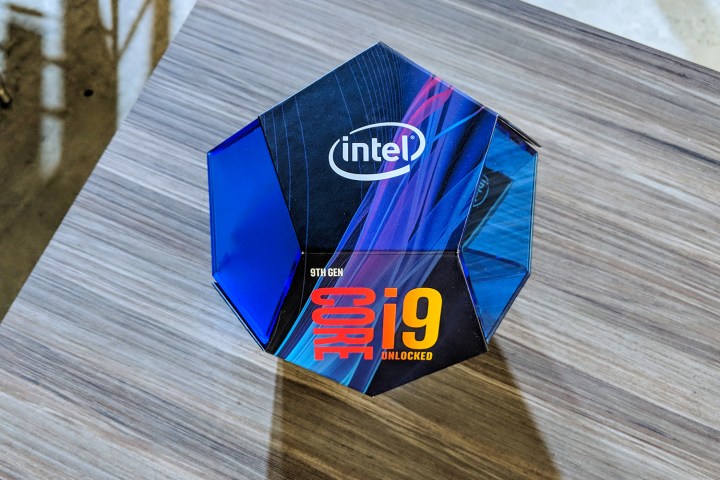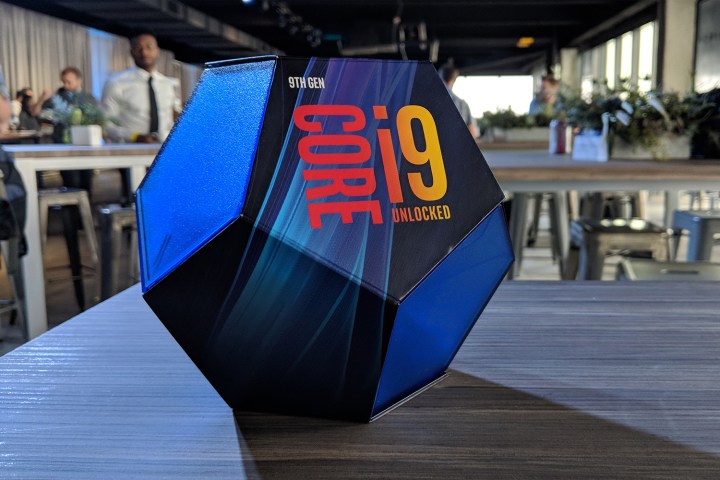
The Core i9-9900K isn’t the first Core i9, but it’s the first one that matters to gamers.
Intel’s Core i9 platform launched well over a year ago, bringing higher core-counts and clock speeds to home desktops. Yet those chips were targeted more towards productivity because they prioritized core count over clock speed. That’s not a winning combination for game performance and, as a result, the Core i9 chips often weren’t the best pick for games.
That’s no longer true. Intel claims the i9-9900K is the “world’s best gaming processor” — in other words, a processor that the average person was meant to own and use. So, does Intel’s latest and greatest live up to the hype, or fizzle under the pressure?
The stakes
Though still built on the familiar Coffee Lake 14-nanometer microarchitecture, the Core i9-9900K is indeed the launch of an entire new generation of processors. With that comes the familiar controversies around performance claims and benchmarks typical of generational launches.
Intel came out of the gate swinging, claiming its new Core i9 bested AMD’s Ryzen processors by as much as 50 percent in some benchmarks. That’s a huge leap, especially since Intel has played catch-up in core count since AMD launched the Threadripper platform just over a year ago. Beyond that, Intel’s well-documented delay of 10-nanometer has been painful to watch, especially as AMD has been building out its 12-nanometer platform throughout all of 2018.
Real-life performance was where the Core i9 blew us away.
But Intel has done it again.
Rather than compete directly with either the Threadripper 1900X or the Ryzen 7 1800X, the Core i9-9900K promises the best of both worlds. It has a base clock speed of 3.6GHz, matching the Ryzen 7, but boosts up to an audacious 5GHz Turbo frequency. Not even the 2nd-gen Threadripper has cracked that milestone. Its core count might be far behind, but the Core i9-9900K can hit higher per-core clock speeds at default settings.
It’s priced like a Threadripper, has the core count of the Ryzen 7, and boosts faster than either. This Core i9 isn’t the same as other processors we’ve seen before.
Record-breaking processing power
We tested the Core i9 in Asus’ new ROG Strix GL12CX desktop, which also featured an Nvidia RTX 2080 and 32GB of RAM. The results weren’t just impressive. They were record-breaking.
We compared the Core i9-9900K against the Ryzen 7 1800X. We also set it side by side with AMD’s Threadripper 1920X and 1950X, both of which have higher core counts than Intel’s product. Still, the Core i9 is the clear winner in every benchmark and test we could put it through.
In synthetic benchmarks like Geekbench, the Core i9 beats the Threadripper 1920X in multi-core scores by around 21 percent. That increases to 28 percent in single-core. It looks even worse for the Ryzen 7, which nearly 40 percent behind Intel.
Against the previous generation Core i7-8700K, the Core i9 matched its single-core performance, but flexed its eight-core muscles by upping its multi-core score by around 25 percent. That’s the kind of improvement two extra cores provides.
Real-life performance tests are where the Core i9 blew us away. The system encoded a 4K video in Handbrake in just one minute and sixteen seconds. That’s the new record for systems we’ve tested, and well over half the time it took AMD’s Threadripper 1920X.
The best gaming processor, indeed
The Core i9-9900K is an attractive processor for any demanding use, but gaming is the headline feature. Its impressive performance makes a difference, though only in games constrained by the CPU.
Civilization VI, which performs many AI calculations simultaneously, benefited greatly from the high clock speeds and eight cores of the 9900K. The Core i9-9990K outperformed the Threadripper 1920X by 40 percent. We saw similar results in Assassin’s Creed: Odyssey, where draw distance and high numbers of NPCs tap the CPU more heavily. In games like these, the Core i9 scores like no other processor.
On the other hand, we saw little improvement over the competition in Deus Ex: Mankind Divided and Battlefield 1. Regardless of whether you’re playing in 4K on Ultra or in 1080p on Medium, much of the processing power was wasted. The GeForce RTX 2080 is doing the heavy lifting here. Game performance is capped by the GPU, not the CPU.
Much of the controversy surrounding the benchmarks of the Core i9 revolve around the Threadripper’s Game Mode, which is said to improve game performance at the expense of peak processor performance. However, it should be noted they don’t ship with the setting on by default, which means gamers probably won’t experience a performance benefit. If you’re curious, though, flipping Game Mode on reduced the 40 percent lead in Civilization VI to 32 percent.
The unsurprising champion
You likely won’t be surprised to hear the world’s best gaming processor comes at a high price. The Core i9-9900K will set you back $530 if you buy it at retail. That’s a huge bump over the $360 i7-8700K or the $374 i7-9700K, and much more expensive than a Ryzen 7 processor. The pricing actually makes AMD’s Threadripper the prime competition.

Luckily for Intel, the Core i9-9900K boasts game performance that beats Threadripper and, on balance, everything else. The processor’s combination of respectable core count and per-core speed is the secret sauce games love.
This doesn’t mean you have to buy the Core i9-9900K. You can enjoy an awesome gaming experience on a far less powerful processor, like Intel’s Core i5-8400 or AMD’s Ryzen 7 2700X. But if you want the best of the best, the Core i9-9900K is it.


